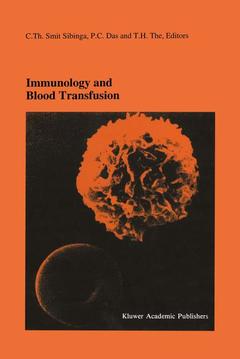Description
Immunology and Blood Transfusion, 1993
Proceedings of the Seventeenth International Symposium on Blood Transfusion, Groningen 1992, organized by the Red Cross Blood Bank Groningen-Drenthe
Developments in Hematology and Immunology Series, Vol. 28
Coordinators: Smit Sibinga C.Th., Das P.C., The T.H.
Language: English
Subjects for Immunology and Blood Transfusion:
Keywords
Antigen; HIV; Laboratory; gene therapy; infectious disease; transplantation
Publication date: 10-2012
303 p. · 16x24 cm · Paperback
303 p. · 16x24 cm · Paperback
Description
/li>Contents
/li>
In transfusion medicine the scientific fundamentals of immunology have had a considerable clinical impact. Transfusion may suppress the immunity but some patients could suffer disadvantages including GvHD, alloimmunisation and possible cancer, where white cells (WBC) play pivotal roles in this phenomenon, presenting antigens and producing cytokines. A clinical application of this practice is LAK-cells targeted against cancer. MHC on the WBC may provide additional immunological modulations through series of secondary messengers. Thus reduction of WBC in the blood and bone marrow may be advantageous for patients. On the other hand, sharing a part of MHC or making the transplanted white cells anergic by storage may be even more advantageous for patients. CMV infection could mimic part of this MHC.
UV radiation is effective in the inactivation of the WBC although filters are easy means for such removal. However, their accurate quantification requires flow cytometry that has considerable potential application in blood transfusions. Idiotypic antibody could play an important role in platelet theory. However, the potential infection risks in transfusion like HIV and HCV remain, but application of molecular biological methods like PCR or RT/PCR has great potentials in detection of infectious diseases, transplantation and genetic disorders. Immuno affinity purified concentrates, like factor IX and protein C, could reduce patients' immune functions, where in the future protein C could be derived from transgenic animals. Advances are sure to emerge through adoptive immunotherapy and gene therapies are exciting prospects when genes transferred into lymphocytes could be used to correct cell mediated immune deficiency, as in ADA.
UV radiation is effective in the inactivation of the WBC although filters are easy means for such removal. However, their accurate quantification requires flow cytometry that has considerable potential application in blood transfusions. Idiotypic antibody could play an important role in platelet theory. However, the potential infection risks in transfusion like HIV and HCV remain, but application of molecular biological methods like PCR or RT/PCR has great potentials in detection of infectious diseases, transplantation and genetic disorders. Immuno affinity purified concentrates, like factor IX and protein C, could reduce patients' immune functions, where in the future protein C could be derived from transgenic animals. Advances are sure to emerge through adoptive immunotherapy and gene therapies are exciting prospects when genes transferred into lymphocytes could be used to correct cell mediated immune deficiency, as in ADA.
Cytokines and Cell Mediated Immunology.- Transfusion-induced Immune Tolerance.- Potential Involvement of Free Radical Reactions in Inactivating Antigen Presenting Cells by Ultraviolet-B Irradiation.- Alloimmunization and Platelet Transfusion Refractoriness.- Graft-versus-host Disease.- Anti-idiotypic Regulation of the Alloimmune Response in Patients Transfused with Platelet Concentrates.- Discussion.- Options for Prevention of T Cell Alloactivation by Blood Transfusions.- Use of Monoclonal Antibodies for Immune Purging in Bone Marrow Transplantation.- Reduction of the Immunogenic Capacity of Blood Components for the Prevention of Alloimmunization to White Cells.- The Effect of Platelets in Red Cell Concentrates on the Leukocyte Depletion Capacity of Leukocyte Depletion Filters.- Leukocyte Depletion of Red Cell Preparations: Fourth Filter Generation Leads to 41og Reduction. How Far Can/Should We Go?.- Immune Targeting of T-lymphocytes.- Humoral Functions of Immunoglobulin: Relationship to Purification Technology of Intravenous Immunoglobulin.- Immune Adsorption Chromatography for Protein Purification.- Discussion.- Immunological Principles in Routine Quality Control Immunocharacteristics and Function Tests.- The Emerging Role of MHC Molecules as Signal Transducing Receptors.- Flow Cytometry in Transfusion Medicine.- New Applications of Molecular Diagnostics in Laboratory Test Systems.- Discussion.- Prospects and Limitations of Adoptive Immunotherapy and Gene Therapy.- Clinical Strategies for the Prevention of Platelet Alloimmunization.- Immune Mediated Transfusion Reactions: Bystander Immune Cytolysis — A Frequently Overlooked Mechanism of Hemolysis?.- Blood Transfusion and Cancer: Modulation or Tolerance?.- Blood Product Induced Immunomodulation and Its ClinicalConsequences.- Transfusion Medicine and Immunological Research: Perspective for the Future.- Discussion.
© 2024 LAVOISIER S.A.S.




